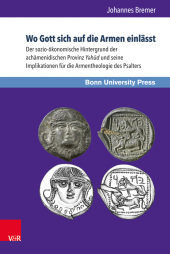 Neuerscheinungen 2016Stand: 2020-02-01 |
Schnellsuche
ISBN/Stichwort/Autor
|
Herderstraße 10
10625 Berlin
Tel.: 030 315 714 16
Fax 030 315 714 14
info@buchspektrum.de |

Johannes Bremer
Wo Gott sich auf die Armen einlässt
Der sozio-ökonomische Hintergrund der achämenidischen Provinz Yehud und seine Implikationen für die Armentheologie des Psalters. Dissertationsschrift
2016. 519 S. 23.2 cm
Verlag/Jahr: V&R UNIPRESS 2016
ISBN: 3-8471-0329-6 (3847103296)
Neue ISBN: 978-3-8471-0329-5 (9783847103295)
Preis und Lieferzeit: Bitte klicken
Wirtschaftliche und soziale Gegebenheiten Judas zur Perserzeit
In verschiedenen Ausprägungen stellen armentheologische Aussagen eine der Hauptlinien des gesamten Psalmenbuchs dar. Die Auseinandersetzung mit einem sozialen und einem metaphorischen Verständnis der verschiedenen Aussagen ermöglicht es dem vorliegenden Band, die wirtschaftlichen und sozialen Verhältnisse Judas zur achämenidischen Zeit (538-332 v. Chr.) zu untersuchen. In drei Kapiteln arbeitet der Autor die schriftlichen und materiellen Hinterlassenschaften der Provinz Yehud zu biblischen, archäologischen und numismatischen Zeugnissen auf und offenbart an der Armentheologie der Psalmen eine Verschärfung der sozialökonomischen Situation im Laufe der achämenidischen Zeit.
One of the major lines, running to the Psalter as a whole, is the theology of the poor. More than every fourth psalm is dealing with the poor or forms of poverty. The discussion about a social background or a metaphorical meaning of poverty shows the lack of knowledge about the economic and social circumstances during Achaemenid period Yehud (538-332 B.C.E.) as a formative phase of the Psalter s redaction and compilation process. Before this background the author points out the (1) biblical, (2), archaeological and (3) numismatic evidence of Achaemenid Yehud. He concludes an escalation of socio-economic poverty, with three different stages during the Achaemenid reign. These stages find their reflection in the theology of the poor in the Psalter, where we can find dynamics as well within the five books of the Psalter, as in the Psalter as a whole. The meaning of poverty in Old Testament texts might become metaphorical, but have their roots in the economic and social backgrounds, as the author shows.


